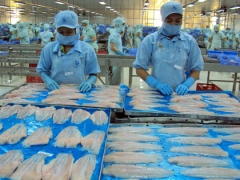VASEP voices against anti- dumping tax on catfish

"We will continue to pursue justice against such an irrelevant and unreasonable tax rates for the sake of Vietnam pangasius industry," it said.
According to Nguyen Hoai Nam, Deputy general secretary of VASEP, Vietnam has about seven days from the DOC’s announcement until it is published in the Official Gazette of US to change the ridiculous decision.
The OG is the official journal of the United States Patent and Trademark Office (USPTO), an agency under DOC. It includes bibliographic information and a representative drawing for each patent granted or trademark published on that issue date.
VASEP and Vietnamese catfish exporters are implementing measures to protect its catfish industry through necessary legal activities to request DOC to change its final decision of the 8th preliminary results of administrative review (POR8) under the laws of the US as well as the agreement of the World Trade Organization.
VASEP also expressed great discontent as DOC had suddenly changed the country of reference, thereby making anti-dumping duty imposed on Vietnam catfish skyrocketed.
In the previous administrative review, DOC had repeatedly protested the choice of Indonesia as the third country for reference to calculate the input costs of the catfish production because this country does not have adequate data on prices and lack of basic financial parameters, said VASEP.
Moreover, Indonesia is a net importer of frozen catfish fillets, mainly from Vietnam, and exports no catfish for the world market. However, now the country of reference is Indonesia.
Previously, DOC always chose Bangladesh as the reference for eight consecutive years in the past to calculate the input costs of the Vietnamese catfish industry.
According to VASEP, the DOC's decision was influenced by the political campaign of the Catfish Farmers of America.
As a result, the final decision of DOC led many to doubt the fairness of the review process as well as transparency from the DOC.
Therefore, VASEP required DOC to review this final decision to be in line with the preliminary administrative review decision announced on September 12, 2012 under all 18 Vietnamese firms exporting catfish fillets to the US would be exempted from anti-dumping taxes.
DOC should be consistent in the use of Bangladesh as the country of reference, VASEP added.
Among the businesses, Vinh Hoan Group has also been enjoying a zero tax rate in the US market for four consecutive years.
The decision was followed DOC’s POR8 for anti-dumping duties on catfish fillets imported from Vietnam from August 1, 2010 to July 31, 2011.
Loose US grip
Local catfish processing enterprises is on the verge of losing the U.S. market due to skyrocketing anti-dumping tax rates recently announced by DOC, said Truong Dinh Hoe, general secretary of VASEP.
Since many Vietnamese firms are enjoying nearly 0 percent anti-dumping tax given the DOC's preliminary decision announced 6 months ago, the recent DOC official decision came as a big surprise, even considered as a shock to the Vietnamese catfish industry.
Compared with the results of POR7, the two most severely affected companies are Vinh Hoan Corp and Anvifish. In particular, Anvifish tax rate increased from $0.03 per kg to $1.34 per kg, while that of Vinh Hoan rose from $0 per kg to $0.19 per kg.
The remaining firms will have an average tax rate of $0.77 per kg, an increase of 25.6 times the tax rate of POR7. In addition, three new firms will also bear a very high tax rate from $1.37 to $3.87 per kg.
This is not the first time DOC has changed the country of reference for a POR. During POR7, initially DOC selected the Philippines, which resulted in an average $0.56 per kg tax rate for Vietnamese firms.
Upon receipt of the preliminary results of the DOC, Vietnamese businesses hired foreign lawyers to protest that, and then DOC had taken data from Bangladesh. Accordingly, the anti-dumping tax rate dropped to $0-$0.03 per kg.
"But this time the DOC reversed the process, initially selecting Bangladesh, and then replacing it with Indonesia,” said VASEP.
According to VASEP, in 2012, the U.S. is the second largest export market of Vietnamese catfish after the EU with a turnover of more than $358 million, accounting for over 20% of the total export turnover of Vietnamese cattish.
What the stars mean:
★ Poor ★ ★ Promising ★★★ Good ★★★★ Very good ★★★★★ Exceptional
Related Contents
Latest News
More News
- Shopee and TikTok Shop account for 8 per cent of Vietnam’s retail market (January 16, 2026 | 00:00)
- Human-centred governance seen as key to AI development (December 19, 2025 | 18:19)
- TECHFEST Vietnam 2025 links startups with policy and capital (December 15, 2025 | 18:21)
- Long Thanh International Airport welcomes first Vietnam Airlines test flight (December 15, 2025 | 18:01)
- Foreign fruits flood Vietnamese market (December 09, 2025 | 13:22)
- Vietnam’s fruit and vegetable exports reach $7.8 billion in first 11 months (December 05, 2025 | 13:50)
- Vietnam shapes next-generation carbon market (November 26, 2025 | 15:33)
- PM urges Ho Chi Minh City to innovate and remain Vietnam’s economic locomotive (November 26, 2025 | 15:29)
- Experts chart Vietnam's digital finance path: high hopes, high stakes (November 14, 2025 | 10:56)
- Vietnam’s seafood imports surge 30 per cent in first 10 months (November 10, 2025 | 19:35)

 Tag:
Tag:




















 Mobile Version
Mobile Version